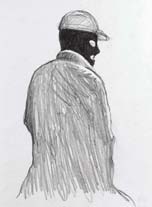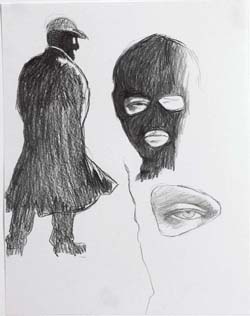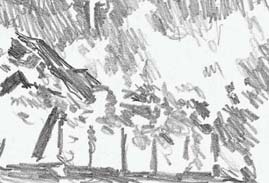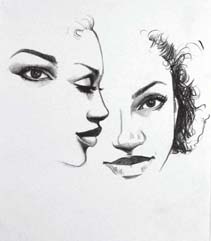Anatomy of Fear (13 page)

“He…” She was squinting, looking inward and reliving it, the pars orbitalis muscles of her cheeks flicking under her loose flesh, an anxious grimace setting in.
“Just relax, Adele. I’m right here with you. You’re safe. Now, think back to the standing man.”
“One minute he was there, the next—” She shook her head.
“It’s okay.” I touched her arm again. “Stay with the picture in your mind, a man standing over the dead man. Trust it, Adele.”
She let out a breath and her facial muscles relaxed with it.
“Now tell me, did you see his face?”
“Yes. No. I saw something, but…I’m not seeing it now.”
“Take your time.”
And she did. Two full minutes passed, me staring at Adele Rubenstein’s wrinkled
punim,
as my Grandma Rose would call it.
“Adele, are you with me?”
She nodded.
“Remember, you’re perfectly safe now, but I need you to go back to that street. You’re taking a walk. Sam is by your side. You look down the street and you see the two men—”
“Yes…”
“You’re getting closer now. The standing man looks up and sees you coming—and you see him.” I saw her expression change, no longer afraid, her incisivi labii muscles puckering her lips with determination. “His face,” I said. “You can see it, I know you can.”
“Yes! I see it! He was colored. Just like the dead man! No, wait, wait. That wasn’t it. He wasn’t colored at all. I’m wrong. I’m dead wrong. I see it now. He was wearing a mask!”
“Tell me about the mask.”
“It was a knit one, not like on Halloween, but the kind you can pull down over your face, with the holes in it.”
“A ski mask?”
“That’s it exactly! He had on a ski mask.”
“Totally covering his face?”
“Total.”
I spent a minute adding that to my drawing.
“Have a look at this, okay?” I turned my pad around.
“Oy vey.”
Adele Rubenstein shivered and rubbed her arms. “Goose bumps. I’ve got goose bumps. You’re a regular Houdini,
you know that, Nathan? It’s like a photograph, you made.” She pointed an arthritic finger at my sketch. “That’s the man. That’s the man I saw.”

T
erri and I were out on the street heading to the spot where the victim had been slain.
“Sorry if I stepped on your toes in there. I just thought—”
“No, it was okay. You were good, the way you drew it out of her. It’s like you’ve got your own kind of interrogation technique.”
“It sort of evolved over the years. I’ve been dealing with witnesses for a long time.”
“Well, it worked.” She smiled. “I’m just sorry I missed your bar mitzvah. I do a damn good
hora.
”
“Too bad I missed it too. Never had one. My mother’s totally assimilated, and my father—”
“Juan the Just.”
I stopped and turned toward her. “You know about my father?”
“Only what I’ve read. That was his nickname, right?”
“What the cops called him, but I didn’t find out until—”
“Yeah, I know. Sorry about that. Must have been tough, losing your dad so young.”
I didn’t want to talk about it and turned the conversation around. “What about you?”
“What about me?” she said, her outer borough accent going a bit harsh.
“I hear your father’s a cop too.”
Her eyebrows pulled together and the corners of her mouth turned down, a combination sad-disgust face, a
blend,
as Ekman would call it. “He’s retired, but still alive, if you call staring at the TV all day alive. Maybe he should come and watch with Sam the blind man.”
“I hear the feds are coming in.”
She nodded, the disgust factor lifting her upper lip. “That’s right.”
“So, we wasting our time?”
“The case is a
collaboration,”
she said, disgust in her voice matching her face. “And I’m still working it. By the way, there’s a total media blackout around this.”
“Isn’t it a little late for that? All three murders have been on page one.”
“All three
unrelated
murders. Get it? Nobody but Hollywood likes a serial killer.”
“The media is going to get it from somewhere. They always do.”
“Just not from us, okay?”
“Wouldn’t tell my mother.”
“You’ve got a mother, Rodriguez?” Russo smiled. “By the way, and you’re going to love this. The G has given the case a code name. They’re calling it—and the unsub—are you ready?—the Sketch Artist.”
“You’re kidding me.”
“Afraid not. The G loves their code names.”
“The newspapers are going to love it too.”
“When
they get it,” she said.
We had reached the corner where Harrison Stone had been
shot and killed. I glanced at the warehouse that ended the street in a dead end, then down at the concrete. I could make out a few places where it was stained darker, possibly from blood, and a shadow slid across my unconscious.
“You mind if I try and draw something?”
“That’s why you’re here. You want me to take a walk, or—?”
“Just give me a few minutes.”
I watched Terri walk toward the corner, her gait determined, but with a slight swaying of her hips, sexy without trying. Then I stopped looking and opened my pad.
I drew for about ten or fifteen minutes.

It was the same shadowy figure in the long coat and ski mask. Something more of the face had materialized, though I couldn’t be sure I wasn’t inventing it. Maybe I’d allowed the witch doctor concept to go to my head.
Terri leaned in for a look. “Wow, you’re fast, Rodriguez.”
“You have to be in my line of work. No agonizing over perfection allowed if you want to get something on paper before it fades from the witness’s memory. “Could be I’m seeing what the witnesses planted in my head.”
“Well, I didn’t hear Adele Rubenstein say anything about the unsub’s eyes. Did Acosta’s wife?”
“No. But there was the other eye I drew. It’s in my mind, but…” I didn’t know where it had come from, and I said so.
“Could be that transference thing you talk about.”
“Could be. But it’s just an eye. Not enough for an ID.”
“Maybe not,” said Terri, looking up at me. “But it’s a start.”
H
e pores over the newspaper looking for some mention of his early work. But there is nothing. All they write about is the new one, the dead man on the Upper East Side. He cuts the story out, pins it above his desk, reaches for a pencil, still staring at the article, no longer reading it, the muscles around his eyes beginning to ache, type blurring. Then a picture starts to swirl in his mind like an eddy gathering force and he needs to draw it, to capture it on paper.

It’s just a fragment, but he recognizes it.
The big one,
he thinks.
Soon.
He prints the word
PATIENCE
below his drawing and puts it aside, but his hand has begun to tremble as a memory slithers into his unconscious and hangs there, a web ready to snare him.
No way he will allow it.
He drops to the floor, balancing on fingertips and boot tips.
Up, down. Up, down. Up, down.
His own private hell, fueling him like hot coals.
Up, down. Up, down.
The sweat has begun to drip from his forehead and gather under his armpits.
Up, down. Up, down. Up, down.
Faster now, blood pumping, fingers aching, arm muscles quivering, breath expelled like gunshots.
Up, down. Up, down.
The demons are breaking up the way his drawings come together, fragmenting, dissolving.
Up, down. Up, down. Up, down. Up, down.
There they go, gone. Dust.
His arms give out. He rolls onto his side, drawing in breath after breath, then slowly pulls himself up and regards his fragmented drawing, recognizes it as just a portion of his opus, his major work, the pieces not quite there yet. In the back of his mind there are mini-explosions like Fourth of July fireworks, gorgeous, thrilling, and he knows in time the drawing will come together and he will make it real.
T
erri had to head back to Midtown North for another meeting with the feds but dropped me at the NYU campus.
I spent what felt like a worthless half hour with the roommate of the murdered college kid, Dan Rice. He and Rice had gone to a bar for a couple of beers before Rice went to get the car he kept in a midtown garage. He was planning to drive out and see his parents, but never made it. The roommate didn’t see anything. No man in a long coat or ski mask. The only thing I learned, which I hadn’t known before, was that Rice was from a wealthy Greenwich, Connecticut, family, but I didn’t think that was enough reason to kill him. He suggested I speak to Rice’s girlfriend.
“Was she with him?” I asked.
“No, but maybe she could tell you something.”
I told the kid he’d make a good cop and he smiled.
I cut across the campus, showed my badge to a guard in the dormitory, and took the elevator to the third floor. I was still thinking about Harrison Stone, the man shot in Brooklyn, when Beverly Majors opened the door.
She was a beauty, but that wasn’t the important part. The important part was that she was black. Harrison Stone’s wife was white. The same was true for Acosta, a Latino.
Interracial couples?
Had the PD put it together too?
I asked Beverly Majors how long she had known Rice and she said about year.
“Did you mostly stay in or go out?”
“We just liked to hang out.” She shrugged, trying to act cool, but she had started to chew her lip and blink a lot; what people do when they’re trying not to cry. “I’d meet him downstairs in Washington Square.” She pointed out the window. “See that bench? We had lunch there like once a week. Sometimes, when we had time, we’d go up to Central Park and take a long walk.”
Washington Square. Central Park. Places to be seen.
But why had the killer gone for Rice and not her?
I couldn’t figure that out.
I asked her if it was all right if I sketched her and she shrugged again. It wasn’t just that she was beautiful. I just felt a need to draw her.
“I don’t look
that
good,” she said when I stopped.
“Sure you do.”
“You going to do anything with it?”
“You want it?”
She shrugged again, but I could see she did, so I tore it out of the pad and handed it to her. I didn’t think I needed it. I had just needed the process.
The process. Drawing.
